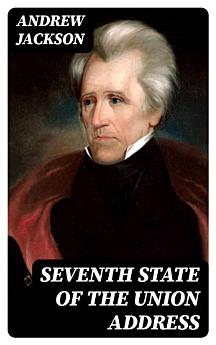Seventh State of the Union Address
Andrew Jackson
ಜೂನ್ 2022 · DigiCat
ಇ-ಪುಸ್ತಕ
29
ಪುಟಗಳು
family_home
ಅರ್ಹವಾಗಿದೆ
info
reportರೇಟಿಂಗ್ಗಳು ಮತ್ತು ವಿಮರ್ಶೆಗಳನ್ನು ಪರಿಶೀಲಿಸಲಾಗಿಲ್ಲ ಇನ್ನಷ್ಟು ತಿಳಿಯಿರಿ
ಈ ಇ-ಪುಸ್ತಕದ ಕುರಿತು
In the 'Seventh State of the Union Address,' President Andrew Jackson provides a detailed discourse on the pressing issues of 1835, with a poignant focus on the significant debt owed by France to the United States—an approximate heft of 50 million francs. This oration, standing as a testament to Jackson's steadfast commitment to the fiscal interests of the nation, is as notable for its content as for its rhetoric. The President's address is systemically enveloped in the literary tradition of persuasive political speech-making that wields both the precision of legal discourse and the impassioned plea for justice, a style aimed at both houses of Congress and the American populace. The Address contextually resonates with the era's prevailing diplomatic tensions, nationalistic fervor, and the American ethos of economic independence, marking a pivotal moment in 19th-century American literature and history. Andrew Jackson, the seventh president of the United States, was known for his strong-willed persona and his dynamic leadership. This speech reflects his zealous advocacy for national financial autonomy and the rightful claims of the American people. It potentially mirrors his background as a military leader who valued honor and duty, translating these virtues into the economic arena. The oration also echoes Jackson's broader agenda of preserving the Union and enforcing federal authority, a consistent thread seen throughout his presidency, especially against the backdrop of previous unsatisfactory dealings with European nations. The 'Seventh State of the Union Address' is not only a vital historical document but also serves as an enlightening read for scholars of political science, history, and rhetoric. It remains especially relevant for those with an interest in the mechanics of American political discourse and international relations of the era. Readers will find the stylistic elements and the strategic craftsmanship of President Jackson's speech compelling, as it provides a window into the complex interplay of national pride, economic policy, and international diplomacy in the early stages of American nationhood.
ಲೇಖಕರ ಕುರಿತು
Andrew Jackson (1767-1845), the seventh President of the United States, was an influential statesman and military leader who played a pivotal role in the nation's formative years. Though best known for his presidency and military successes, such as his victory in the Battle of New Orleans during the War of 1812, Jackson also contributed to the literary field with his political writings. His 'Seventh State of the Union Address' is a prime example of his rhetorical prowess and reflects his philosophies on governance. Jackson's tenure was marked by controversial policies like the Indian Removal Act, which have spurred considerable debate amongst historians and critics. His style in the 'Seventh State of the Union Address' is characteristically forthright and populist, exemplifying the vigor of his era's political discourse. The address provided insight into the inner workings of the Jackson administration, revealing his thoughts on issues such as the national debt, government spending, and foreign policy. While not traditionally considered a literary figure, Jackson's contributions through his addresses and proclamations offer valuable primary source materials for understanding the political climate and ideology of the Antebellum United States. His oratory and writings remain subjects of study for those interested in American history, politics, and rhetoric.
ಈ ಇ-ಪುಸ್ತಕಕ್ಕೆ ರೇಟಿಂಗ್ ನೀಡಿ
ನಿಮ್ಮ ಅಭಿಪ್ರಾಯವೇನು ಎಂದು ನಮಗೆ ತಿಳಿಸಿ.
ಮಾಹಿತಿ ಓದುವಿಕೆ
ಸ್ಮಾರ್ಟ್ಫೋನ್ಗಳು ಮತ್ತು ಟ್ಯಾಬ್ಲೆಟ್ಗಳು
Android ಮತ್ತು iPad/iPhone ಗೆ Google Play ಪುಸ್ತಕಗಳ ಆ್ಯಪ್ ಇನ್ಸ್ಟಾಲ್ ಮಾಡಿ. ಇದು ನಿಮ್ಮ ಖಾತೆಯನ್ನು ಸ್ವಯಂಚಾಲಿತವಾಗಿ ಸಿಂಕ್ ಮಾಡುತ್ತದೆ ಮತ್ತು ನೀವು ಎಲ್ಲೇ ಇರಿ ಆನ್ಲೈನ್ ಅಥವಾ ಆಫ್ಲೈನ್ನಲ್ಲಿ ಪುಸ್ತಕಗಳನ್ನು ಓದಲು ಅನುಮತಿಸುತ್ತದೆ.
ಲ್ಯಾಪ್ಟಾಪ್ಗಳು ಮತ್ತು ಕಂಪ್ಯೂಟರ್ಗಳು
Google Play ನಲ್ಲಿ ಖರೀದಿಸಿದ ಆಡಿಯೋಬುಕ್ಗಳನ್ನು ನಿಮ್ಮ ವೆಬ್ ಬ್ರೌಸರ್ನ ಕಂಪ್ಯೂಟರ್ನ ಲ್ಲಿ ಆಲಿಸಬಹುದು.
eReaders ಮತ್ತು ಇತರ ಸಾಧನಗಳು
Kobo ಇ-ರೀಡರ್ಗಳಂತಹ ಇ-ಇಂಕ್ ಸಾಧನಗಳ ಕುರಿತು ಓದಲು, ನೀವು ಫೈಲ್ ಅನ್ನು ಡೌನ್ಲೋಡ್ ಮಾಡಬೇಕಾಗುತ್ತದೆ ಮತ್ತು ಅದನ್ನು ನಿಮ್ಮ ಸಾಧನಕ್ಕೆ ವರ್ಗಾಯಿಸಬೇಕು. ಫೈಲ್ಗಳು ಮತ್ತು ಬೆಂಬಲಿತ ಇ-ರೀಡರ್ಗಳನ್ನು ವರ್ಗಾವಣೆ ಮಾಡಲು ವಿವರವಾದ ಸಹಾಯ ಕೇಂದ್ರ ಸೂಚನೆಗಳನ್ನು ಅನುಸರಿಸಿ.





